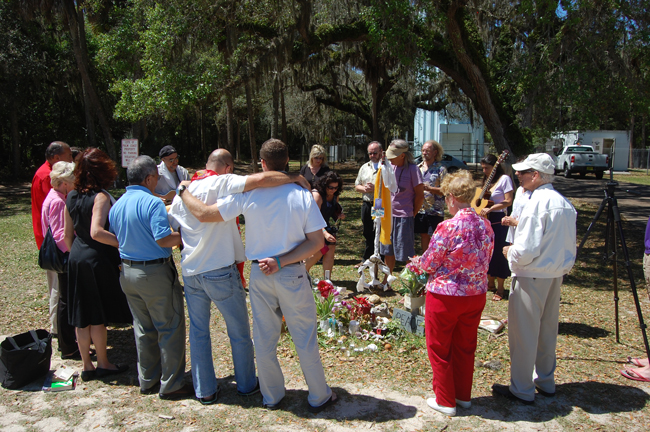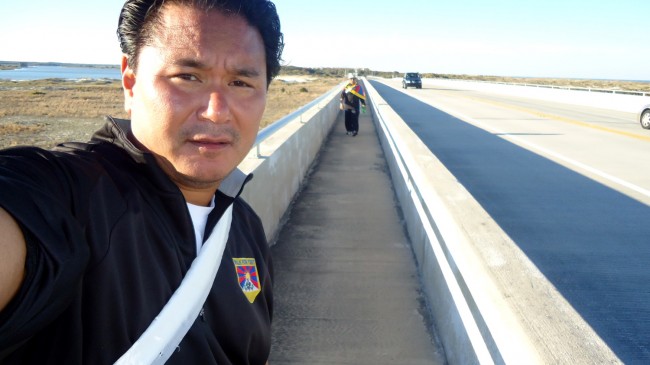
In Tibetan tradition, the period of mourning lasts 49 days, with prayers said every seven days. It was 49 days ago Sunday that Jigme Norbu, the Tibetan activist and nephew of the Dalai Lama, was killed on State Road A1A in Flagler County on the first day of his Walk for Tibet Florida—Norbu’s 20th such walk, totaling some 8,000 miles, to raise awareness for Tibet’s occupation by China.
Norbu was finishing his Valentine’s Day walk the evening of Feb. 14, less than a mile from his destination for the evening, in the Hammock. It was dark. Norbu was walking on the pavement, hugging the white line by the shoulder. A driver never saw him. Norbu was struck and killed instantly. He was 45 and a father of three.
Click On:
- Dalai Lama’s Nephew Killed by a Car While Walking for Tibet on A1A in the Hammock
- Jigme Norbu Remembered, and His Mission Honored
- A Morning Memorial on A1A for Jigme Norbu Before His Walk Resumes By Other Steps
- Behind the Story: Jigme Norbu’s Death–and Flagler’s Responsibility to His Last Steps
- Walk for Tibet Website
At noon on Sunday, 25 people gathered at the site of Norbu’s death, where a roadside memorial of flowers, rocks, images scarves, bells and scepters has been maintained since the accident, and conducted a ceremony known as shay-gu, “which in a sense,” said Donna Kim-Brand, who’d planned Norbu’s last walk with him and was part of his support group, “releases the spirit of the departed either to be reincarnated if they haven’t already or to go on to further development as is their Karmic destiny.”
Wangchuk Dorjee, a 67-year-old former Tibetan member of parliament and Norbu’s walking partner on several walks, including his last, was also at roadside Sunday, leading the prayers, as was Brian Scrone of St. Augustine. It was at Scrone’s house that Norbu spent his last night, the day before setting off on what was to be a three-week walk from St. Augustine to West Palm Beach, where, as a younger man and boy, he spent several summers at Ann Norton’s Sculpture Gardens. Norbu’s late father, a leading activist for Tibet in his day, was a friend of Norton’s.
“We had a beautiful dinner celebration at our house,” Scrone said of that last night. The following morning, the walk began with a modest ceremony on a pier by Scrone’s house. Then Norbu and Dorjee set off. “We gave him a big hug and told him we hope to see you in a couple of weeks in West Palm,” Scrone said. Latyer that evening he received the surreal phone call announcing Norbu’s death. Scrone,, who’s in real estate in St. Augustine, along with his business partner, suspended those duties at that point and decided to be part of the core group of almost a dozen people who chose to continue, and finish, Norbu’s walk in his honor.
Which they did, on Feb. 26, with his brother, Kunga, 48, and sons Tenzin, 13, and Jensen, 9, ending the trip with a one-mile walk from Centennial Park in West Palm Beach to the Ann Norton Sculpture Gardens. A memorial service and a celebration followed. “I know my brother would be very proud of what we’re doing,” Kunga Norbu, a Bloomington, Ind., resident, told the Sun Sentinel that day. “He died for a cause, and that cause was for human rights, independence for Tibet and world peace. Just me coming is an honor, too. It’s to honor him. This is how he would want it.”
China invaded Tibet in October 1950 and declared it a “national autonomous region” the following year, though the country has remained under the effective control of Beijing. A revolt broke out in 1959, and the dalai lama escaped to India, where the Tibetan parliament in exile has been located since. Most people are unaware of Tibet’s fate beyond some vague recognition that it is on a few celebrities radar screen as a place worthy of bumper-sticker attention. Norbu’s walks aimed to get beyond the bumper sticker: he invited conversations with people he met along the way, taking every opportunity to educate people about Tibet’s recent history and taking part in other marches and demonstrations calling for the country’s return to its people. China, however, has been conducting a cultural genocide in the area, slowly, gradually eradicating local culture and replacing it with Mandarin norms while encouraging mass migration from eastern China to Tibet.
Politics were not part of the ceremony at roadside in the Hammock Sunday, under a bright sun shaded by a stately oak that curves above Norbu’s memorial. Those gathered there held lit incense, heard Jamie DeFrates and Susan Brown sing, and listened to Scrone read a poem by Rumi, the Sufi mystic:
This we have now
is not imagination.
This is not grief or joy.
Not a judging state,
or an elation,
or sadness.
Those come
and go.
This is the presence
that doesn’t.
[…]This that we are now
created the body, cell by cell,
like bees building a honeycomb.
The human body and the universe
grew from this, not this
from the universe and the human body.
Richard Hamilton, a local resident (and the president of the Flagler Auditorium board) who was at the accident scene 49 days ago–he was on his way to meeting Norbu for dinner–appeared before the Flagler County Commission this morning (April 4) to brief commissioners on the ceremony in the Hammock, which he concluded with a wish: “Hopefully we can do something to keep that memory alive,” Hamilton said.































rickg says
While I certainly mourn the tragic death of Jigme Norbu, the pragmatist in me really wishes he had walked away from the right of way or on the sidewalk across the street.
Carol P says
Such a tragedy. I’m sorry I wasn’t aware of the Memorial until now. I would have like to honor the man and the issues he walked to support.